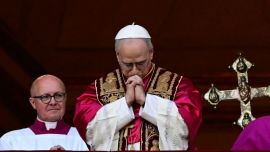Argentina’s Central Bank intervened to stop a dollar bond sale by Banco Supervielle halfway through the trading day on Friday, according to two people with knowledge of the matter, a move that could avert pressure on the peso in the parallel exchange market.
Supervielle had already received demand from clients for the deal, which sought to raise US$100 million in total through two six-month bonds. The instruments were split into two tranches: one in pesos and another in US dollars, the latter to be paid offshore using freely available foreign currency, according to the people, who asked not be named discussing private information.
The peso auction was executed, but the monetary authority called Supervielle executives Friday and asked them to halt the sale of its dollar debt, according to the people. Supervielle later informed brokers, including Balanz, SBS and Allaria, the auction wouldn’t go forward.
A Central Bank spokesman declined to comment. Press offices for Supervielle and brokers involved didn’t immediately respond to requests for comment.
The Central Bank plans to issue a dollar-denominated bond, called a bopreal, in the coming days, which will seek to capture demand from companies that need to transfer dividends abroad.
The auction’s complex structure acted as a financial loophole for Argentine companies, currently restricted by the country’s capital controls from buying dollars at the official rate, to gain access to greenbacks via the debt market. Companies including fintech Tarjeta Naranja and Banco Galicia used a similar auction framework in separate sales in the past two weeks.
The deal was especially attractive for Supervielle’s corporate clients: brokers sold the bonds to firms in pesos, giving them the right to collect dollars abroad in six months, effectively buying the foreign currency at the parallel rate, which is near multiyear lows in real terms. The rate closed Friday at approximately 1,154 pesos per dollar, according to data compiled by Bloomberg.
Supervielle was receiving dollars from the brokers who acquired the currency by buying in the parallel market, known locally by its Spanish acronym CCL. That created additional demand in the parallel FX market — something the Central Bank is working to contain as it lets the peso float freely within a range, a key ingredient to its US$20-billion agreement with the International Monetary Fund.
For Supervielle, the operation meant access to dollar funding close to zero percent interest rate — an opportunity that both the issuer and investors were eager to seize, before the Central Bank stepped in. Banks use those dollars to lend to exporters at interest rates of seven percent per year, one of the people said.
At the close of the auction, the bank declared the sale of dollar bonds void and announced that it had issued 48.2 billion pesos at a variable rate of TAMAR (34 percent) plus a spread of 3.5 percent.
related news
by Ignacio Olivera Doll, Bloomberg






















Comments